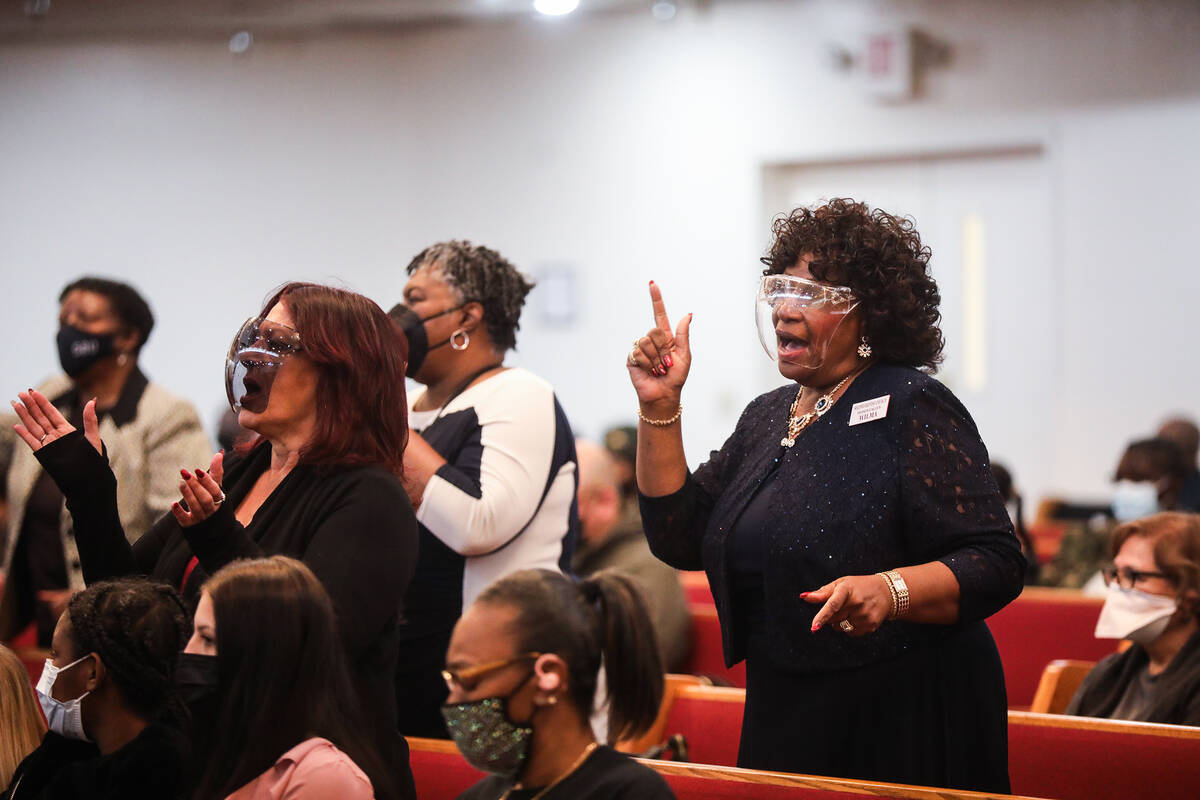
Although Louisiana schools desegregated right before Charles Lee Bilberry’s senior year in 1969, he was not allowed to attend his graduation ceremony, he said, because “the white parents didn’t want their children to graduate with colored children.”
Bilberry collected his diploma from the principal’s office and soon moved to Southern Nevada. He recalled his mother’s hug and kiss on the cheek when she told him, “Son, when you go to Las Vegas, be the best that you can be.”
He spoke of the moment Sunday afternoon during an Interfaith Service at Second Baptist Church in the Historic Westside to commemorate the Martin Luther King Jr. holiday.
And while Bilberry experienced discrimination in Las Vegas, as well, he fulfilled the promise to his mother, attending UNLV, becoming a published author and retiring as an engineer supervisor after 30 years with the Las Vegas Water District.
Citing a King speech, Bilberry told the roughly 100 congregants to “be the best that you can be: If you want to be a street sweeper, sweep the streets like Michelangelo painted a picture, but be the best street sweeper that there is on the street.”
The church service was part of a series of King Week events organized by the Dr. Martin Luther King Jr. Committee, including the 40th annual parade honoring the civil rights icon Monday morning in downtown Las Vegas.
The 90-group procession is scheduled to start at 10 a.m. at Fourth Street and Gass Avenue and ending at Ogden Avenue.
Gov. Steve Sisolak, former Metropolitan Police Department Undersheriff Kevin McMahill and the Rev. Clayton D. Moore, of Second Baptist, were among the speakers Sunday.
“I want to remind us that the privileges that we enjoy today have not always been that way,” Moore said. “There was a time in America’s history that we were segregated, not only based on our economic condition, but on the color of our skin.”
The congregants clapped when Moore asked: “We’ve come a long way, haven’t we?”
Still, the fight for equality is not over, Moore said, citing “segregated systems,” including schooling, economics and even the way Americans worship.
“Sunday morning worship services,” he said, “is still some of the most segregated time in America’s tenure now.”
Interfaith services like Sunday’s, which welcome speakers from different religious denominations, aim to remedy that.
“One of the great things that Dr. King has for us to reflect upon is that the struggle is not over,” Moore said. “The occasion is not simply for us to look back on, but rather to seek, to strive forward: that equality must be made available, that justice must be practiced tempered with mercy.”
Sonya Pearson, vice president and provost for the College of Southern Nevada’s Charleston campus, said that King’s legacy “left imprints” in her life.
“The struggle is still there. I didn’t walk into this day thinking it was going to be easy,” she said. “My color was very clear.”
Pearson, who said she was the first Black student to enroll in a Missouri university in 2001, noted that Black youth now have the opportunity not only to say what they want to be, but to demand change when they witness injustice.
“God equipped me with a mind to be a doctor, to be a lawyer, to be a licensed professional counselor,” she said, describing her profession in academia as a calling. “But here’s the thing: You can have all these titles and initials behind your name, it means nothing.”
The program included live music, with congregants clapping and swinging their bodies side to side, and the Las Vegas Unity Dancers, who contorted their bodies to a recording of a worship song.
In brief remarks, Sisolak addressed the racial progress that has been made in Nevada, but noted that there are still ways to go, pledging that his office would continue to address inequalities.
Later, Sisolak took to Twitter to thank the Las Vegas congregation and to condemn the scenes from a Texas synagogue, where a man interrupted a service and held people hostage on Saturday before he was killed by an FBI hostage rescue team.
“Today in particular, I am thinking about how we must ensure houses of worship as continued safe places of refuge,” the governor wrote.
McMahill, who is campaigning to become Clark County’s next sheriff, spoke about the history of racism in the criminal justice system.
“We have to acknowledge history,” he said. “We have to acknowledge what happened so that we don’t ever repeat that history, that we learn from the mistakes that we’ve made.”
He said police-community relations have turned the Historic Westside into one of the safest communities in the valley.
“I’m going to continue to make sure that those authentic relationships are built so that we continue to see the humanity in one another, that you don’t see me as a white man and I see you as a Black man, that we see that we’re human beings, first and foremost,” McMahill said to applause.
He quoted King, saying that “hate cannot drive out hate, only love can do that. And I love you, and I love this community.”
Contact Ricardo Torres-Cortez at rtorres@reviewjournal.com. Follow him on Twitter @rickytwrites.
Review-Journal photographer Rachel Aston contributed to this story.